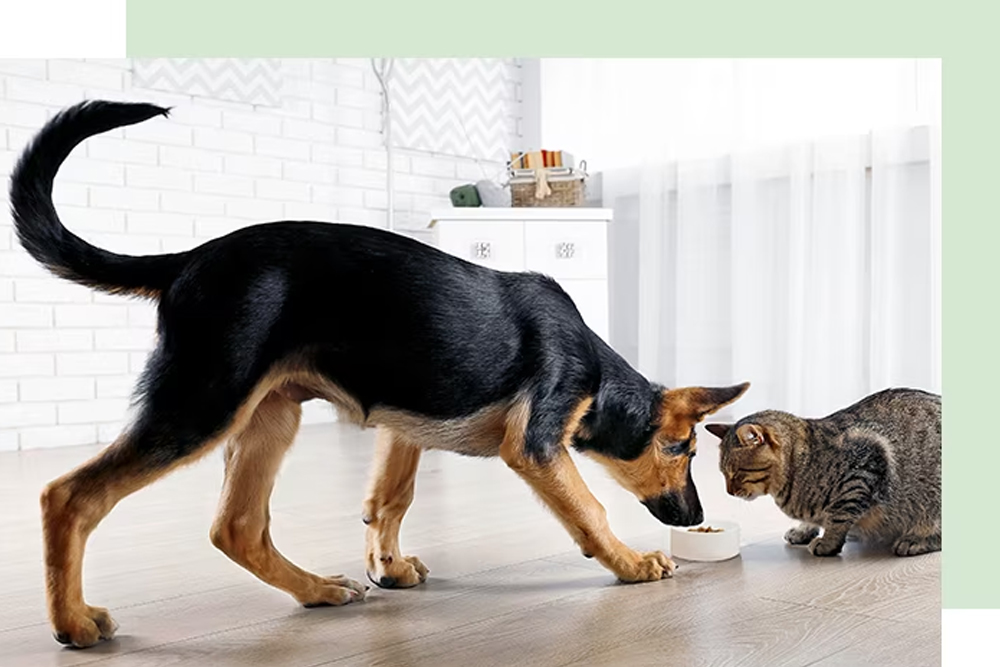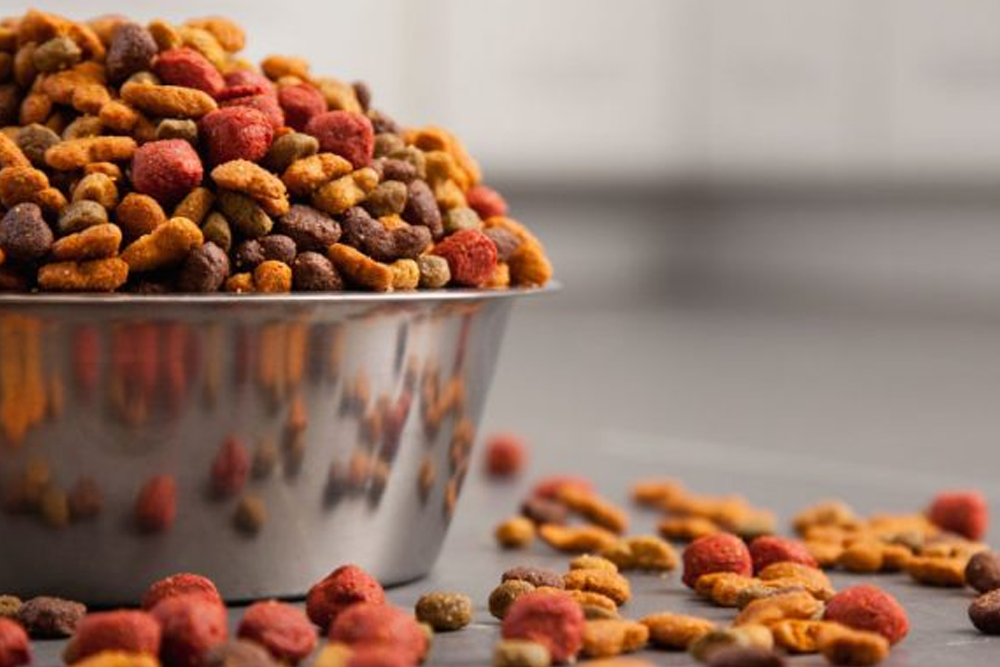What happens when you feed your pet the wrong food or at the wrong time

If you are a pet owner, you probably want your pet to be food and happy. One of the most important aspects of your pet’s well-being is their nutrition. What they eat, how much they eat, and when they eat can have a significant impact on their physical and mental health.
However, many pet owners struggle with feeding their pets properly. Some pets may be too picky, too greedy, or too irregular in their eating habits. Some pets may have special dietary needs or preferences that are hard to meet. Some pets may have behavioral problems related to food, such as begging, stealing, or guarding.
Related articles
1- Treat Your Pet Like Family: 10 Fun Activities to Do Together
2- Keep Your Pet Healthy and Happy with Regular Veterinary Check-ups
3- How to Keep Your Pets Mind Sharp with Unique Games and Foods!
4- From Fat to Fit: Home Exercises for Your Obese Pet
How can you educate your pet to eat well and at the right time? How can you make sure that your pet is getting the best nutrition possible? How can you avoid or solve any feeding issues that your pet may have? In this article, we will answer these questions and give you some practical tips on how to feed your pet properly.
We will cover the following topics:
- The importance of educating your pet to eat well and at the right time
- The benefits of a good nutrition for your pet
- The problems of a poor nutrition for your pet
- The steps to educate your pet to eat well and at the right time
- The common challenges and solutions for feeding your pet
Let’s start by looking at the importance of educating your pet to eat well and at the right time.
Here is a development of 900 words in English about the topic How to educate your pet to eat well and at the right time:
The importance of educating your pet to eat well and at the right time
Educating your pet to eat well and at the right time is not only a matter of convenience for you, but also a matter of health and happiness for your pet. By feeding your pet properly, you can:
- Provide them with the nutrients and energy they need for their growth, development, and maintenance
- Prevent or treat any nutritional deficiencies or excesses that may affect their health
- Support their immune system and prevent or fight diseases
- Maintain their ideal weight and prevent obesity or malnutrition
- Promote their dental health and prevent dental problems
- Enhance their mood and behavior and prevent stress or anxiety
- Strengthen your bond and communication with your pet
As you can see, feeding your pet properly is essential for their well-being. But how can you do it? What are the benefits of a good nutrition for your pet? And what are the problems of a poor nutrition for your pet? Let’s find out.
The benefits of a good nutrition for your pet
A good nutrition for your pet means providing them with a balanced diet that meets their specific needs and preferences. A balanced diet for your pet should include:
- High-quality protein sources, such as meat, fish, eggs, or dairy products
- Healthy fats sources, such as oils, nuts, seeds, or fish oil
- Complex carbohydrates sources, such as grains, vegetables, fruits, or legumes
- Vitamins and minerals sources, such as fruits, vegetables, herbs, or supplements
- Water sources, such as fresh water or wet food
Continuando o texto em inglês sobre o tema Como educar o seu pet a comer bem e na hora certa:
By providing your pet with a balanced diet that suits their age, size, breed, and activity level, you can offer them many benefits, such as:
- Improving their digestion and metabolism
- Supporting their muscle and bone health
- Enhancing their skin and coat health
- Boosting their brain and nerve function
- Regulating their hormones and reproductive health
- Increasing their lifespan and quality of life
A good nutrition for your pet can also help them cope with any special conditions or situations that they may have or face, such as:
- Allergies or intolerances
- Diabetes or other metabolic disorders
- Arthritis or other joint problems
- Kidney or liver problems
- Pregnancy or lactation
- Stress or anxiety
A good nutrition for your pet can make a big difference in their health and happiness. But what happens if you don’t feed your pet properly? What are the problems of a poor nutrition for your pet? Let’s see.
The problems of a poor nutrition for your pet
A poor nutrition for your pet means providing them with an unbalanced diet that does not meet their specific needs and preferences. An unbalanced diet for your pet may include:
- Low-quality protein sources, such as by-products, fillers, or meat meals
- Unhealthy fats sources, such as animal fats, hydrogenated oils, or trans fats
- Simple carbohydrates sources, such as sugars, starches, or refined grains
- Synthetic or artificial vitamins and minerals sources, such as preservatives, colorings, or flavorings
- Contaminated or spoiled water sources, such as tap water or stagnant water
By providing your pet with an unbalanced diet that does not suit their age, size, breed, and activity level, you can cause them many problems, such as:
- Impairing their digestion and metabolism
- Weakening their muscle and bone health
- Damaging their skin and coat health
- Reducing their brain and nerve function
- Disrupting their hormones and reproductive health
- Shortening their lifespan and quality of life
A poor nutrition for your pet can also worsen any special conditions or situations that they may have or face, such as:
- Allergies or intolerances
- Diabetes or other metabolic disorders
- Arthritis or other joint problems
- Kidney or liver problems
- Pregnancy or lactation
- Stress or anxiety
A poor nutrition for your pet can have serious consequences for their health and happiness. That’s why it’s important to educate your pet to eat well and at the right time. But how can you do it? What are the steps to educate your pet to eat well and at the right time? And what are the common challenges and solutions for feeding your pet? Let’s find out.
The steps to educate your pet to eat well and at the right time
Educating your pet to eat well and at the right time is not a difficult task if you follow some simple steps. Here are some tips on how to do it:
- Continuando o texto em inglês sobre o tema Como educar o seu pet a comer bem e na hora certa:
- Choose the best food for your pet. The first step is to select a high-quality food that meets your pet’s nutritional needs and preferences. You can consult with your veterinarian or a pet nutritionist to help you choose the best food for your pet. You can also do some research online or read some reviews from other pet owners. You should look for a food that has natural ingredients, high protein content, healthy fats, complex carbohydrates, vitamins and minerals, and no artificial additives or preservatives. You should also consider your pet’s age, size, breed, and activity level when choosing a food. You may need to try different foods until you find the one that your pet likes and tolerates the most.
- Determine the right amount and frequency of feeding your pet. The second step is to decide how much and how often to feed your pet. This will depend on several factors, such as your pet’s weight, age, activity level, health condition, and metabolism. You can follow the feeding guidelines on the food package or consult with your veterinarian or a pet nutritionist to help you determine the right amount and frequency of feeding your pet. You should also monitor your pet’s body condition and adjust the feeding accordingly. You should aim to keep your pet at a healthy weight, neither too thin nor too fat. You should also avoid overfeeding or underfeeding your pet, as this can cause health problems.
- Establish a regular feeding schedule for your pet. The third step is to set a regular feeding schedule for your pet. This will help your pet develop a healthy eating habit and prevent any behavioral problems related to food. You should feed your pet at the same time and place every day, preferably in a quiet and comfortable area where they can eat without distractions or interruptions. You should also avoid feeding your pet before or after exercise, as this can cause digestive issues. You should also avoid feeding your pet too early or too late in the day, as this can affect their sleep quality and energy levels.
- Teach your pet to eat calmly and patiently. The fourth step is to teach your pet to eat calmly and patiently. This will help your pet enjoy their food and prevent any stress or anxiety related to food. You should avoid rushing or forcing your pet to eat, as this can cause them to choke or vomit. You should also avoid rewarding or punishing your pet for eating or not eating, as this can create a negative association with food. You should also avoid giving your pet any human food or table scraps, as this can spoil their appetite and cause health problems. You should also avoid giving your pet any treats or snacks between meals, as this can make them overweight and reduce their interest in their regular food.
- Praise and reward your pet for eating well and at the right time. The fifth step is to praise and reward your pet for eating well and at the right time. This will help your pet develop a positive association with food and reinforce their good eating behavior. You should praise your pet verbally or with a gentle pat when they eat their food calmly and patiently. You should also reward your pet occasionally with a healthy treat or a toy when they finish their food at the right time. You should also show your affection and attention to your pet after they eat their food, as this will make them feel loved and satisfied.
- By following these steps, you can educate your pet to eat well and at the right time. But what if you encounter some challenges or difficulties along the way? What are some common challenges and solutions for feeding your pet? Let’s see.
Continuando o texto em inglês sobre o tema Como educar o seu pet a comer bem e na hora certa:
The common challenges and solutions for feeding your pet
Feeding your pet properly may not always be easy or smooth. You may face some challenges or difficulties that may require some patience and creativity to overcome. Here are some common challenges and solutions for feeding your pet:
- Your pet is too picky and refuses to eat their food. This may be because your pet is used to a different food, has a sensitive stomach, or simply does not like the taste or texture of their food. To solve this problem, you can try to mix their old food with their new food gradually until they get used to it. You can also try to warm up their food slightly or add some water or broth to make it more palatable. You can also try to offer different flavors or varieties of their food until you find the one that they like the most.
- Your pet is too greedy and eats too fast or too much. This may be because your pet is hungry, bored, stressed, or has a competitive instinct. To solve this problem, you can try to feed your pet smaller portions more frequently throughout the day. You can also try to use a slow feeder bowl or a puzzle feeder that makes your pet work for their food and slows down their eating pace. You can also try to feed your pet separately from other pets or in a calm and quiet area where they can eat without distractions or interruptions.
- Your pet begs, steals, or guards their food. This may be because your pet is insecure, anxious, or dominant. To solve this problem, you can try to ignore your pet’s begging behavior and avoid giving them any human food or table scraps. You can also try to keep your pet away from any food sources that they may try to steal or guard, such as the kitchen counter, the trash can, or other pets’ bowls. You can also try to teach your pet some basic commands such as “sit”, “stay”, or “leave it” that can help you control their food-related behavior.
By following these tips, you can overcome any challenges or difficulties that you may face when feeding your pet. You can also consult with your veterinarian or a pet behaviorist if you need more guidance or assistance.
We hope that this article has helped you understand how to educate your pet to eat well and at the right time. If you have any questions or comments, please feel free to contact us. We would love to hear from you.
Thank you for reading and have a wonderful day with your pet!
Sobre o Autor




0 Comentários